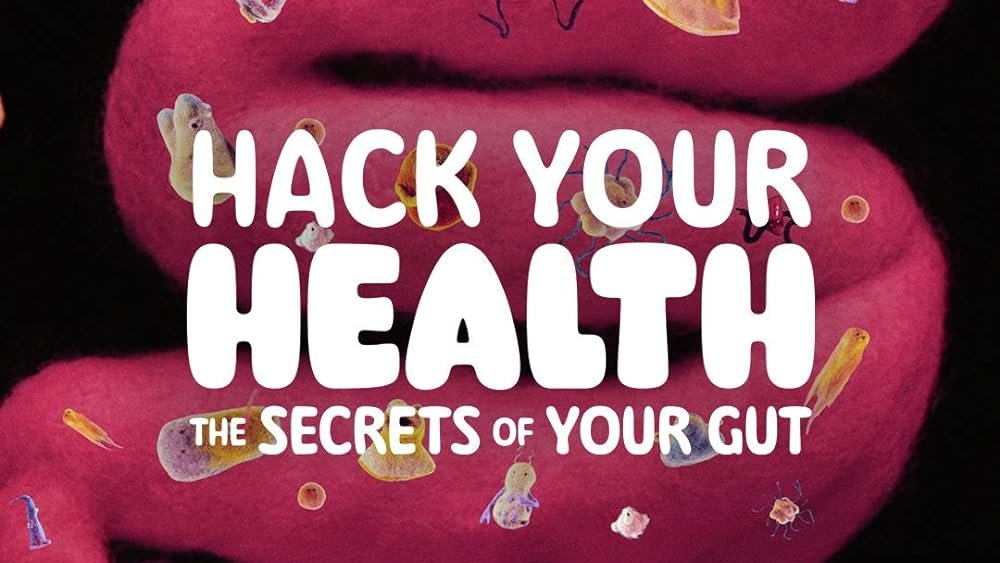As a team of scientists, doctors and patients passionate about studying the gut and making at-home microbiome test kits more accessible, we were super excited to see the release of Netflix’s Hack Your Health documentary. The documentary featured some of the best experts in the field but we especially enjoyed hearing from Giulia Enders as her Ted Talk has always been a favorite.
We highly recommend watching the documentary if you haven’t already (it’s not too long!). You’ll learn more about the microbiome, how influential your gut is to your overall health and what you could learn from testing your own gut microbiome. While there is still so much still to learn in the gut science and biomedicine fields, we thought the Hack Your Health documentary was a great recap of what we do know about the gut microbiome so far. Keep reading for our review of Netflix’s Hack Your Health documentary and the most important takeaways we think everyone should know.
1 - The gut microbiome is a powerhouse for overall health
As a microbiome testing and health tracking startup, the Injoy team was pleased to hear it repeated throughout the documentary just how important the gut microbiome truly is. Our gut is a powerhouse for overall health, influencing everything from weight management to immune function and disease susceptibility. And it’s not just about digestion; the gut is at the center of our wellbeing, impacting mental health and chronic diseases as well. Early in the Hack Your Health documentary Giulia Enders, scientist and author of the bestseller "Gut: The Inside Story of Our Body's Most Underrated Organ," shared in the beginning of the documentary, “Gut science has been the hottest area in all of biomedicine for the last decade or more. It is the missing part of the puzzle. Our gut affects our whole body. It can even affect certain conditions in the brain.”
2 - Our guts need a lot more fruits & vegetables each day
If you could only take away one tip from the Hack Your Health documentary, it would be the importance of increasing the amount of fruits & veggies you’re eating each day and working towards increasing your daily fiber intake. For optimal gut health, aim for a variety of plant-based and fermented foods. In fact, Eran Segal, a computational and systems biology scientist focused on nutrition, genetics and the microbiome research, recommended eating 20 to 30 different fruits and vegetables each week. We need significantly more fruits and vegetables each day to help us get about 30+ grams of fiber daily (ideally more as the film mentions!).
“Current recommendations in the United States suggest that we should be eating 28 to 40 grams of dietary fiber per day. And we're only eating 15 grams in the average American diet. The field of microbiome science is realizing that we probably should be eating in excess of 50 grams per day,” explained Justin Sonnenburg, Ph.D., an associate professor at Stanford's Department of Microbiology and Immunology. It’s so important to increase fiber intake and the variety of plant-based foods to help support bacterial diversity in our gut microbiome, which is key to preventing chronic diseases.
3 - Your gut microbiome is highly unique, just like a fingerprint
Your gut microbiome is like a fingerprint of your health, shaped by your diet, environment and experiences from birth, and is highly unique to you. This explains, in part, why people on the same diet, even twins, can have vastly different health outcomes. “We oftentimes believe that our human genes determine our health, but now we know that the microbiome is very central to being obese, being depressed, having allergies, or how stressed or relaxed you'll feel. We don't know how big is the part that it plays in these entities. For some people, it might be really relevant, and for others, it might be smaller,” Giulia Enders added.
Your gut is extremely unique to you which is why personalizing your diet based on a comprehensive microbiome analysis is much more effective than generic diets. For instance, one of the examples shared in the film was if you’re low on Prevotella bacteria, which is associated with difficulty losing weight, you may benefit from incorporating foods that boost its growth. At Injoy, we not only offer microbiome testing but also take it a step further by considering your symptoms and lifestyle for truly personalized recommendations. Supporting our belief that the microbiome becomes truly valuable when considered within the context of our overall health, not in isolation.
4 - Our gut actually communicates with our brain
Something many people might not have known before the Hack Your Health documentary is just how connected gut health and mental health are. In fact, our gut and brain are in constant communication! Dr. Annie Gupta, a neuropsychologist at UCLA, explained, “Think of the brain and the gut as BFFs. So if either one is not working, the other eventually is gonna follow suit. It may be what allows us to enjoy the food we eat, to tell us what to eat, when to eat, and it's not only that the microbes could affect your brain, but it's the food you take that can affect the microbes that can affect your brain.”
So how exactly do the gut and brain communicate? Your gut health can influence your mood through direct communication supported by the vagus nerve, the production of short-chain fatty acids, and neurotransmitters, which have been linked to conditions like depression and anxiety. So there’s actually truth behind sayings like a “gut feeling”.
Conclusion
We thought the Hack Your Health documentary was extremely well done and loved getting to see some of the best experts in the field being featured. We think the documentary did a good job explaining what the gut microbiome is, its importance for overall health and how microbiome at-home test kits can help individuals gain personalized insights. With more people understanding how the gut microbiome can influence everything from weight management to immune function to disease susceptibility and even mental health, we expect even more people looking to take an at-home microbiome test in the next few years, in our slightly biased opinion. 😉
Kimmie Gilbert featured on the Hack Your Health documentary was impressed by the results of her at-home microbiome tests laughingly saying, “I'm kind of amazed, actually. I mean, just to be able to find out all those different things about myself, simply from testing poop!”
If you’re not quite ready to test your own gut microbiome and get personalized recommendations, there are still steps you can take today to begin caring for your gut microbiome. The simplest yet most impactful change you could make is to simply begin increasing your daily fruit and vegetable intake! The diversity of plant-based foods is also highly important so aim for a variety. As Eran Segal explained to Kimmie on the documentary, “We talked about ABCs, "always be counting, not calories, but always be counting the number of fruits and vegetables that you have per week. Between 20 and 30 is usually considered good.”


